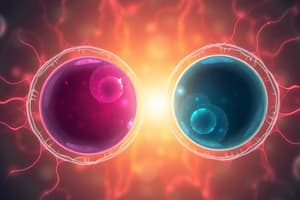Podcast
Questions and Answers
How do chromosomes behave differently in meiosis and mitosis?
How do chromosomes behave differently in meiosis and mitosis?
The homologous chromosomes form pairs.
How do sex cells differ from body cells?
How do sex cells differ from body cells?
Sex cells have half of the genetic information that body cells have.
What is the number of chromosomes in a human?
What is the number of chromosomes in a human?
There are 23 chromosome pairs in a human male.
What are homologous chromosomes?
What are homologous chromosomes?
Why do organisms need sex cells?
Why do organisms need sex cells?
How are sex cells made?
How are sex cells made?
What is meiosis?
What is meiosis?
What is the function of meiosis?
What is the function of meiosis?
What are the stages of meiosis?
What are the stages of meiosis?
What happens during meiosis I?
What happens during meiosis I?
What occurs during prophase I?
What occurs during prophase I?
What occurs during metaphase I?
What occurs during metaphase I?
What happens during anaphase I?
What happens during anaphase I?
What occurs during telophase I and cytokinesis?
What occurs during telophase I and cytokinesis?
What happens during meiosis II?
What happens during meiosis II?
What occurs during prophase II?
What occurs during prophase II?
What happens during anaphase II?
What happens during anaphase II?
What occurs during telophase II and cytokinesis?
What occurs during telophase II and cytokinesis?
How does meiosis compare to mitosis?
How does meiosis compare to mitosis?
How is meiosis related to sexual reproduction?
How is meiosis related to sexual reproduction?
If a sexually reproducing organism has 28 chromosomes in its body cells, how many chromosomes did it inherit from each parent?
If a sexually reproducing organism has 28 chromosomes in its body cells, how many chromosomes did it inherit from each parent?
Flashcards are hidden until you start studying
Study Notes
Meiosis Overview
- Meiosis is a specialized form of cell division producing haploid sex cells (gametes) like eggs and sperm.
- It consists of two main stages: meiosis I and meiosis II.
Chromosomes in Meiosis vs. Mitosis
- In meiosis, homologous chromosomes pair up, while in mitosis, chromosomes are replicated and divide without pairing.
- Meiosis reduces chromosome number by half, while mitosis maintains the chromosome number.
Characteristics of Sex Cells
- Sex cells, or gametes, contain half the genetic information (23 chromosomes in humans) compared to body cells, which have 46 chromosomes.
- Body cells incorporate all chromosome pairs, while sex cells contain only one chromosome from each pair.
Homologous Chromosomes
- Homologous chromosomes have similar structures, sizes, and carry the same genes but can differ in versions (alleles) of those genes.
- Sex chromosomes in humans are designated as X and Y.
Necessity of Sex Cells
- Essential for maintaining chromosome number during reproduction; prevents doubling of chromosome count in new organisms when gametes fuse.
Process of Meiosis
- Meiosis I divides homologous chromosomes, leading to two cells with half the chromosome pairs.
- Meiosis II separates sister chromatids in the resulting two cells, producing four haploid cells.
Stages of Meiosis I
- Prophase I: Chromosomes are duplicated and pair up.
- Metaphase I: Nuclear membrane disintegrates; chromosome pairs align in the cell's center.
- Anaphase I: Chromosome pairs separate and move to opposite ends.
- Telophase I and Cytokinesis: Cells divide into two with chromatids still attached.
Stages of Meiosis II
- Prophase II: No new copying of chromosomes; nuclear membrane breaks down.
- Metaphase II: Chromosomes line up in the center of each cell.
- Anaphase II: Sister chromatids are pulled to opposite sides.
- Telophase II and Cytokinesis: Cells divide again, resulting in four haploid cells.
Comparison to Mitosis
- Mitosis produces two identical cells, maintaining chromosome count, while meiosis produces four genetically diverse haploid cells.
- Only sex cells undergo meiosis; all other cells undergo mitosis.
Meiosis and Sexual Reproduction
- Meiosis is crucial for sexual reproduction as it generates the sex cells required for offspring formation.
- In sexually reproducing organisms with 28 chromosomes, each parent contributes 14 chromosomes to the offspring.
Studying That Suits You
Use AI to generate personalized quizzes and flashcards to suit your learning preferences.




